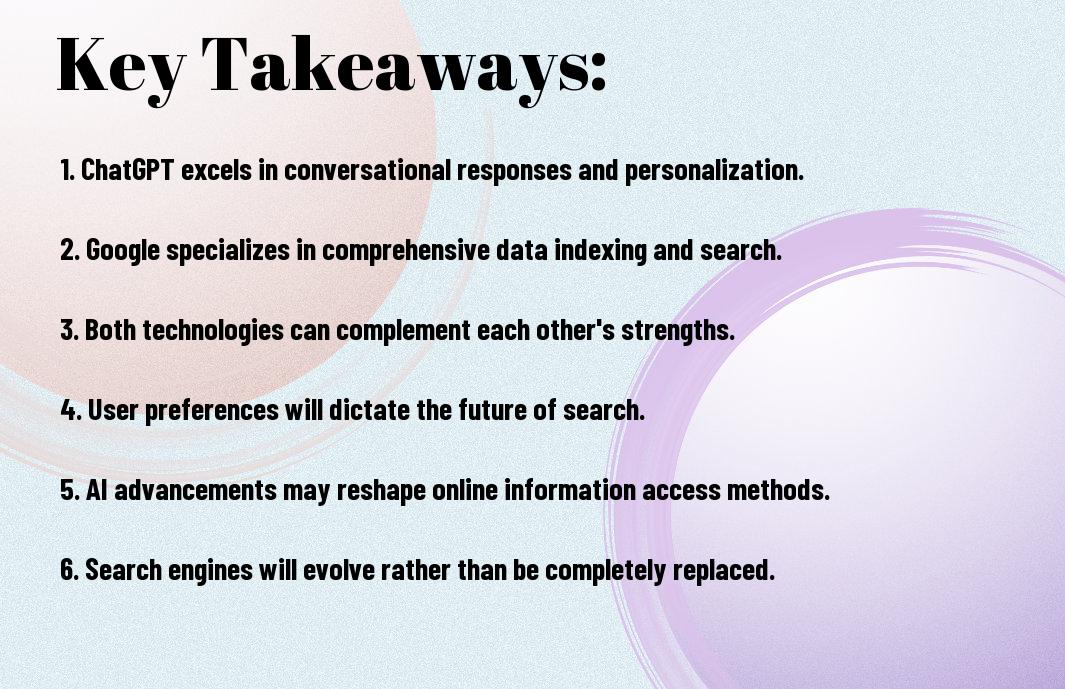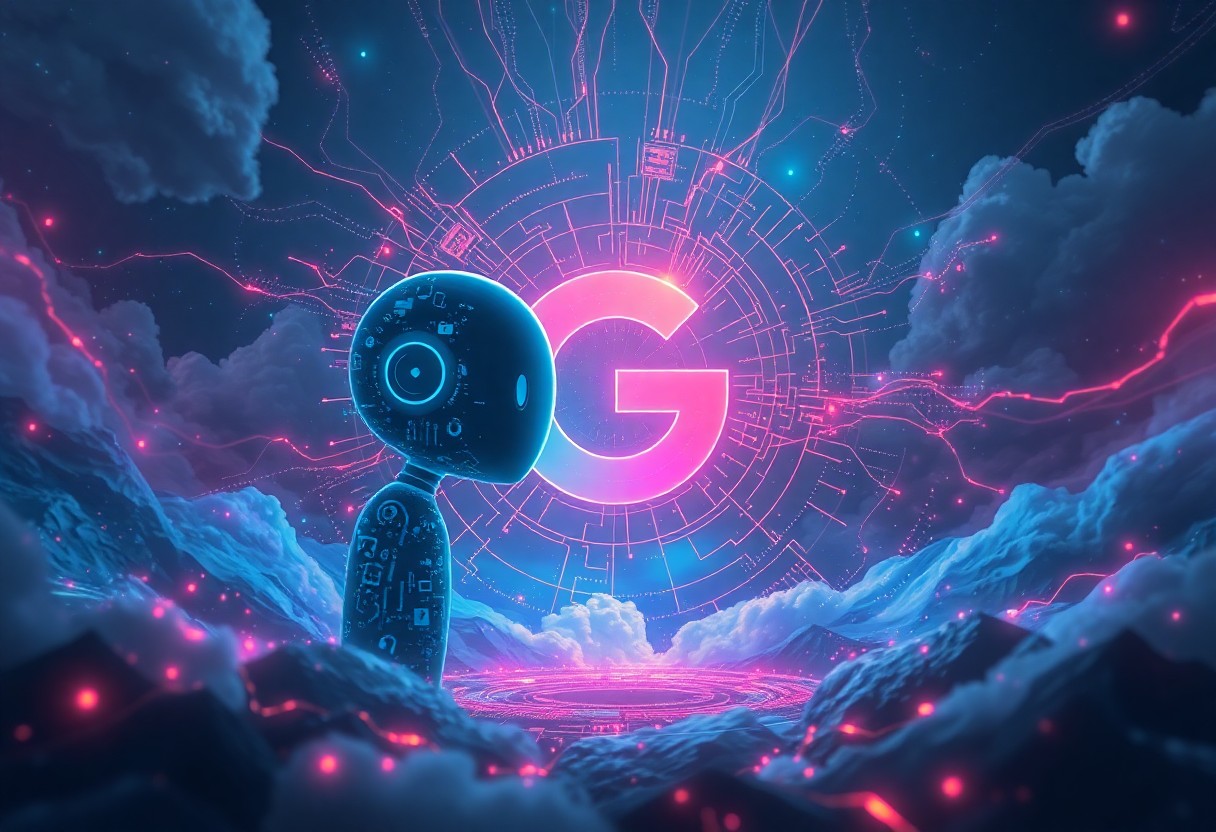It’s natural to wonder about the future of search technologies, especially as innovative AI models like ChatGPT continue to emerge. You may be curious about whether these advancements could challenge established giants like Google in information retrieval. In this post, we will explore how ChatGPT differs from traditional search engines, the potential impacts on your online searching habits, and what this could mean for the future of digital interactions. Join us as we navigate the evolving landscape of AI and search technology.
Key Takeaways:
- Different Purposes: ChatGPT and Google serve distinct functions; ChatGPT focuses on conversational AI, while Google excels in search engine capabilities.
- Complementary Tools: Rather than replacing Google, ChatGPT can enhance user experience by providing more contextualized answers to specific queries.
- Technological Advancements: Ongoing improvements in AI could reshape how we access information, yet it is unlikely for ChatGPT to fully displace established search engines like Google.

Understanding ChatGPT Technology
Before you investigate deeper into the implications of ChatGPT, it’s important to understand the technology behind it. This AI conversational model is changing how we interact with machines and process information, raising questions about its potential impact on search engines like Google.
Overview of ChatGPT
At its core, ChatGPT is built on a model known as GPT (Generative Pretrained Transformer) developed by OpenAI. It uses deep learning techniques to generate human-like text responses based on the input it receives. This ability allows for dynamic conversations and a more intuitive search experience.
How ChatGPT Works
Against traditional search engines, ChatGPT processes language contextually, utilizing vast amounts of data to generate relevant responses. The model uses tokens to understand and synthesize information, enabling it to offer coherent and context-aware replies. This creates a conversational experience that differs significantly from typical search results.
Plus, the way ChatGPT functions involves analyzing patterns in the data it was trained on and generating text based on those patterns. It relies on a transformer architecture that allows it to understand relationships in language and context, resulting in responses that feel more like a dialogue than a simple query result. This sophisticated approach may enhance user interaction but requires careful management to ensure accuracy and reliability.
Limitations of ChatGPT
Alongside its impressive capabilities, ChatGPT does have limitations. It can sometimes produce incorrect or nonsensical information and is unable to access real-time data or browse the internet. This may hinder its usefulness in situations requiring the latest information or facts.
Understanding these limitations is vital as you consider the functionalities of ChatGPT compared to traditional search engines. While it excels in conversational ability, it lacks the ability to verify a source or access current updates, making it less reliable for certain types of inquiries. As you explore ChatGPT, keep these limitations in mind to set realistic expectations for its performance.
The Rise of AI and Search Engines
Clearly, the advancement of artificial intelligence (AI) has significantly altered how you interact with information online. The emergence of tools like ChatGPT has prompted many to question the traditional search engine landscape. If you’re wondering Will ChatGPT replace Google?, you’re not alone. As AI continues to evolve, it reshapes our expectations for search and information retrieval.
Evolution of Search Engines
By understanding the history of search engines, you can appreciate how they have advanced from simple keyword matching to complex algorithms that consider context, relevance, and personalization. Early search engines provided basic functionality, but enhancements over time have integrated sophisticated features that allow for smarter user interactions.
The Role of AI in Modern Search
After years of development, AI now plays a pivotal role in enhancing search engine capabilities. It enables more intuitive results by understanding user intent, processing natural language, and providing personalized search experiences that adapt to your preferences and behavior.
Modern search engines leverage AI technologies to improve not just the precision of search results but also to anticipate your needs. Machine learning algorithms analyze vast datasets, parse your queries, and return tailored suggestions. This transition from static keyword searches to dynamic engagements revolutionizes how you access information, making it faster and more relevant.
Comparison of Traditional vs. AI-powered Search
Beside the transition to AI-powered search, it’s beneficial to compare how traditional search engines function in contrast to their modern counterparts. Below is a comparison in a simplified format:
Traditional Search Engines | AI-powered Search Engines — | — Keyword-based | Contextual understanding Static responses | Dynamic, personalized results Limited interaction | Conversational interfaces Primarily text-focused | Multi-modal (text, images, audio)
Search engine technology has shifted from static algorithms that retrieve data based solely on keywords to dynamic systems that adapt to your unique queries and preferences. This evolution offers you a more engaging and informative search experience than ever before.
Conclusively, understanding the differences between traditional and AI-powered search engines can help you navigate the evolving online landscape. As AI continues to improve its algorithms, your search experience will become more personalized and efficient, allowing you to find what you need quickly and effectively.
ChatGPT vs. Google Search
Despite their different functionalities, ChatGPT and Google Search serve as necessary tools in your information-gathering arsenal. While Google excels at indexing and presenting vast amounts of data, ChatGPT offers unique conversational capabilities that can redefine how you interact with machines.
Strengths of ChatGPT
Along with its ability to engage in dialogue, ChatGPT provides context-aware responses tailored to your inquiries. It allows for more nuanced conversations, making it easier for you to explore topics in depth without sifting through pages of search results.
Strengths of Google Search
Google provides unparalleled access to information, offering millions of indexed websites at your fingertips. Its sophisticated algorithms quickly parse through vast data, ensuring you can find relevant articles, videos, and images in seconds.
Hence, Google Search leverages powerful algorithms to deliver accurate results based on your queries. With features like autocomplete, search filters, and quick links to trusted sources, it streamlines your research process, enhancing efficiency and reliability when you’re seeking information on a topic.
User Experience: ChatGPT vs. Google
User experience differs significantly between ChatGPT and Google Search. While ChatGPT provides a conversational interface that mimics human interaction, Google delivers a more traditional search engine experience, offering a variety of links, images, and ads for you to sift through.
For instance, when you search on Google, you frequently encounter a list of links, each requiring you to assess which may contain the information you need. In contrast, ChatGPT can present you with instant answers or summaries, which may be more suited to those who prefer direct interaction rather than combing through multiple resources. This makes it easier for you to quickly zero in on what you’re looking for without navigating away from the conversation.
The Impact of ChatGPT on Information Retrieval
Once again, we find ourselves at the crossroads of technology and information retrieval. As ChatGPT continues to evolve, its influence on how we search and consume information is becoming increasingly apparent. Understanding the nuances of this impact will be vital in navigating the digital landscape. Let’s investigate deeper into specific aspects that highlight this transformation.
Enhanced Query Understanding
Among the primary advantages of ChatGPT is its ability to grasp the context and intent behind your queries. Traditional search engines often struggle to interpret nuanced requests, making it challenging for users to find exactly what they need. ChatGPT, however, utilizes advanced natural language processing to better understand your input, allowing for richer and more accurate responses.
Contextual Responses vs. Links
One significant shift in how information is delivered is the transition from traditional links to more contextual responses. Rather than merely providing a list of URLs related to your query, ChatGPT generates responses that synthesize information tailored specifically to your needs.
Hence, this shift means you receive summarized knowledge or direct answers without having to sift through multiple sources. This approach can save you time and provide a more streamlined experience, allowing you to quickly access the information you find relevant and useful. However, it also raises questions about the completeness and reliability of the information presented, as it may lack the breadth of sources typically associated with a conventional search engine.
Implications for Content Creators
By adapting to the rise of ChatGPT, content creators will need to reconsider their strategies for attracting an audience. As users become accustomed to immediate, conversational responses, crafting content that aligns with this format will be imperative to remain relevant.
Considering the need for content to be more engaging and relevant, you should focus on how you present information to make it digestible for conversational models. This may involve utilizing natural language, structuring content for easy extraction, and ensuring that it addresses potential queries directly, thus positioning your work to perform well in this evolving landscape of information retrieval.
Market Response to ChatGPT
Now, as ChatGPT continues to evolve and gain traction, the market has been quick to react. Companies across various sectors are assessing how this cutting-edge AI technology impacts their operations and strategies. The emergence of ChatGPT has led to both excitement and apprehension as businesses look to adapt to this new reality.
Industry Reactions to ChatGPT’s Growth
Behind the scenes, many tech companies are evaluating the implications of ChatGPT’s rapid rise. Some perceive it as a threat to traditional search engines, while others view it as an opportunity to integrate AI into their services. This has spurred conversations around innovation and competitive strategies within the industry.
Search Engine Optimization (SEO) in the Age of AI
Across the digital landscape, SEO practices are undergoing transformation due to AI’s influence. As more users turn to conversational AI for information, businesses need to reconsider their approaches to content creation and optimization for search engines.
Optimization strategies are shifting towards a focus on natural language processing and user intent. To stay ahead, you must incorporate AI insights into your keyword research and content strategies. By adapting your SEO techniques to align with AI functionalities, you can enhance user experience and improve your website’s visibility in search results.
User Adoption and Trust in AI Solutions
Beside the technological advancements, user adoption plays a significant role in shaping the future of ChatGPT. Your willingness to embrace AI-powered solutions will largely determine how quickly these tools integrate into daily life.
Even as AI solutions become increasingly prevalent, trust remains a barrier for some users. Building confidence in these technologies requires transparency about how they function and a commitment to user privacy. As you interact with ChatGPT and similar AI tools, your experiences will influence the wider acceptance and integration of AI into everyday tasks.
Future Prospects for ChatGPT and Google
Not all technologies will coexist seamlessly, and the competition between ChatGPT and Google is no exception. You might be intrigued by the perspectives shared in this article about how ChatGPT has officially replaced Google Search for me. As the digital landscape evolves, both platforms will likely shape and influence web searches in unique ways.
Potential Developments in AI Search Technologies
Future advancements in AI search technologies could significantly refine how you access information. The integration of natural language processing and machine learning could enhance the accuracy and relevance of search results, thereby improving user experience across both ChatGPT and Google.
Collaboration Opportunities
On the horizon, there may be numerous collaboration opportunities between AI platforms like ChatGPT and traditional search engines such as Google. These partnerships could lead to innovative features that combine the strengths of both technologies for an improved search experience.
This collaborative potential could manifest in many forms, such as integrating ChatGPT’s conversational abilities with Google’s expansive database. You could find yourself benefiting from a more personalized and efficient search experience, where queries are understood contextually, leading to quicker and more accurate results.
Predictions for Market Dynamics
Collaboration among AI platforms and traditional search engines could significantly alter market dynamics. You may witness a shift toward more hybrid models that utilize the best features of both technologies to meet diverse user needs.
Hence, the synergy of ChatGPT and Google could lead to a dynamic market where users enjoy a more versatile search environment. You can expect a blend of conversational AI and robust search capabilities, potentially paving the way for a more engaging and informative online experience.
Ethical Considerations and Challenges
Keep in mind that as chatbots like ChatGPT evolve, they bring to the forefront various ethical considerations and challenges. In particular, the implications for data privacy, misinformation, and bias must be addressed to create a responsible framework for their use.
Data Privacy Concerns
Among the primary issues that arise with AI-driven tools is the concern over data privacy. Your interactions with such systems may involve sharing sensitive information, raising questions about how this data is stored, used, and potentially exploited.
Misinformation and Content Authenticity
Data generated by AI systems can sometimes be misleading, leading to confusion and the spread of misinformation. As you interact with these applications, it’s vital to verify the information before accepting it as fact.
Content generated by AI may not always undergo the same rigorous editorial oversight and fact-checking that traditional content does. Consequently, you might find that the information provided can vary in terms of accuracy and reliability, posing risks when relied upon for critical decisions or for sharing with others.
AI Bias and Its Implications
For AI systems to be effective, they must be trained on diverse and representative datasets. If you use a tool that isn’t adequately diverse, it may reflect biases that can perpetuate stereotypes or unfairly disadvantage certain groups.
Consequently, the implications of AI bias are significant, as it not only affects the quality of the content you receive but can also shape your perceptions and beliefs. Addressing these biases is vital to ensure that the technology serves everyone equitably, promoting a more balanced conversation in the digital landscape.
Final Thoughts on ChatGPT's Impact on Search Technology
Now that you’ve explored the potential impact of ChatGPT on search engines like Google, it’s clear that while AI models can transform how you access information, they’re not poised to entirely replace traditional search methods. Instead, they can complement your search experience by providing nuanced answers and conversational assistance. As technology evolves, keeping an eye on how AI tools integrate with existing platforms will be key to enhancing your informational journeys.
Q: Will ChatGPT replace Google as a search engine?
A: ChatGPT and Google serve different purposes. Google is primarily a search engine that indexes and retrieves vast amounts of information from the internet in response to keyword queries. In contrast, ChatGPT is an AI language model designed to generate human-like text based on user prompts. While ChatGPT can provide detailed answers and explanations on various topics, it lacks the capability to browse the internet in real-time and access live data, which is a core function of Google. Therefore, ChatGPT is not set to replace Google, but rather complement it by offering conversational interactions and personalized responses.
Q: How does ChatGPT compare to Google in providing information?
A: ChatGPT is designed to converse and provide responses that may feel more engaging and tailored to individual inquiries. It can summarize information, offer explanations, and assist with writing tasks. On the other hand, Google excels at retrieving a broad array of sources and current updates across numerous topics. While ChatGPT can synthesize knowledge based on its training, it does not have access to real-time data, news, or specific web pages that Google can provide. Users may prefer ChatGPT for conversational purposes, but for comprehensive research and up-to-date information, Google remains a stronger option.
Q: Are there any limitations to using ChatGPT instead of Google?
A: Yes, there are several limitations when using ChatGPT as opposed to Google. Firstly, ChatGPT cannot conduct real-time searches or access the latest information available on the internet, which means it cannot provide updates on fast-changing topics. Secondly, the knowledge base of ChatGPT is limited to what it was trained on, and while it can generate creative responses, it may not always provide accurate or current information. Additionally, ChatGPT may not include citations or sources for the information it shares, which is often available through Google search results. Therefore, while ChatGPT can be useful for certain inquiries, users should consider these limitations when deciding whether to use it or Google for information retrieval.




